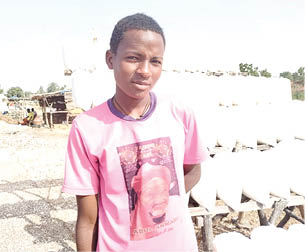Yobe, Bauchi communities make fortunes from cassava flour
The residents of Birniwa and Bursori villages in Katagum and Dambam local governments of Bauchi State and Murfakalam community in Damaturu Local Government Area of Yobe State have a history of farming and processing of cassava flour for over a decade. These communities mainly in Yobe and Bauchi border communities of North East Nigeria, are […]

17weeklypage32
The residents of Birniwa and Bursori villages in Katagum and Dambam local governments of Bauchi State and Murfakalam community in Damaturu Local Government Area of Yobe State have a history of farming and processing of cassava flour for over a decade.
These communities mainly in Yobe and Bauchi border communities of North East Nigeria, are in cassava farming and production to make fortunes, which is now gradually gaining acceptance by many farmers across the border communities.
The cassava, being one of the major crops cultivated in the middle belt, Nigeria and now gaining a momentum in North East, experts say, venturing into its farming can increase food sufficiency in the country.
Speaking to a Weekend Trust reporter who visited some of the communities that are cultivating the cassava in bordering communities, the farmers called on the federal and state governments’ support to cultivate more hectares of farmlands as they also sought for establishment of an industry for the processing of the cassava.
- FG to support 400,000 farmers for dry season
- Imports from Chad, Ghana, others crash grains prices in Niger markets
One of the residents of Birniwa, Malam Auwal Hassan, a cassava farmer, said cassava farming has helped them in managing their families, and it has become a source of income to many of them.
‘‘Some years ago, we didn’t make any profit from it. In fact, it was a loss due to some circumstances which are unavoidable. But now we thank God we have made profit and fortunes out of it.
‘‘Cassava farming has helped us in taking care of our families and it has become a source of income to many of us. I have gotten married with what I am getting and soon I will give out my daughter in marriage with what I got this year,’’ he said.
Weekend Trust learnt that cassava is a tropical and subtropical root crop that is a staple food for millions of individuals. In Nigeria, cassava is a common food grown by small-scale farmers in many parts of the country, and it’s also being processed and used in different forms.
Abubakar Musa, a cassava farmer and marketer, told Weekend Trust that the cassava is processed locally, dried by roadside and packaged in polythene bags which can be sold at two thousand five hundred naira after it has been processed, while the unprocessed fifty kilogramme bag is sold at thirty-five thousand.
‘‘Each bag of locally processed cassava (cassava flour) which we package in a polythene bag as you can see can be sold at two thousand naira. While a bag of unprocessed dried cassava (Alibo) is sold at thirty-five thousand naira.
‘‘We assembled them by the roadside for commuters and travellers to buy from us, and we thank God people are patronising our goods. We have achieved a lot from this occupation.
‘‘Most of the residents of these communities rely so much on cassava farming and processing to make fortunes. We inherited this brisk business from our forefathers and when we grew up, we took over from them and we are hoping that our children would follow in our footstep,’’ he said.
Adamu Usman, a resident of Bursori, told Weekend Trust that the issue of rural-urban migration among the youths has reduced drastically after they have discovered the potential of the farmlands.
‘‘Before in the last year, we could not record bumper harvest like this year. Thank God! When you cultivate one hectare, you can harvest about thirty bags and each bag is sold between N30,000 and N50,000.
‘‘The attention of our teeming youths who have been migrating from these communities to Lagos, Bayelsa, Cross River and Delta states have been drawn to this occupation.
‘‘Many of them have dropped their ambition of rural-urban migration. They are harnessing the potential of their farmlands. Some of them are millionaires now. This is to tell you how important this occupation is,’’ he said.
Malam Nurudeen Mohammed, a senior lecturer with Yobe State College Of Agriculture, Gujba, says not all species of cassava can be consumed by human beings before processing. He said a lot of communities are now into cassava farming and are yielding turnover.
‘‘The cassava farming has improved the livelihood of the farmers of these communities as well as the growth of the domestic product (GDP) of the Nation. As you are going into some areas along Gujba roads and Katarko areas, a lot of people are cultivating and making fortunes out of cassava,’’ he said.
The Yobe State commissioner, ministry of agriculture and natural resources, Hon. Ali Goniri, revealed that Governor Mai Mala Buni of the state has directed the ministry to supply free consignments of cassava stem for farmers across the state.
‘‘We in the ministry of agriculture and natural resources decided to reintroduce the cultivation of cassava, so as to supplement the usage or the consumption of other serial crops,’’ he said.
